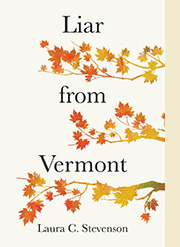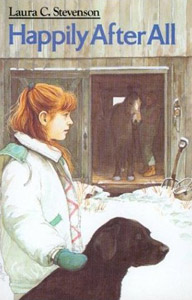A New Series: One Minute Reviews of
Books by Vermont Authors
Laura's column "One Minute Reviews" has appeared bi-weekly in Wilmington, Vermont's Deerfield Valley News since 2015. In April 2018, she found that no Vermont periodical consistently reviews all commercially published fiction and non-fiction by Vermont authors, so she started a series to fill that void. Published reviews from that series and some earlier reviews of local authors are listed with links to a scan of the printed copy. Reviews still in queue are listed without links until they appear in print.
The books reviewed in this series are available through Wilmington's Pettee Memorial Library, the Whitingham Free Public Library, and locally owned Bartleby's Books in Wilmington.
Deerfield Valley News, 5/9/2024
A Tragedy of Eugenics
Paul Harding, This Other Eden: A Novel. W.W. Norton & Company, 2023
Behind the plot of this beautiful book there lies the ugly history of Malaga Island, the 19th century home to a small mixed racial fishing community off the coast of Maine. In 1912, Maine’s governors, their desire to build a hotel on the island justified by their belief in eugenics, evicted all Malaga’s residents, burned their houses, dug up their cemetery, and forcibly sent eight islanders to the Maine School for the Feeble Minded. Rather than write a “straight” historical novel about this event, Harding has recreated the island, given it unforgettable residents, and written a tragedy of displacement that portrays the persecutions of eugenics in the larger moral context of the Fall.
Harding’s Apple Island (1500 feet long, 1200 feet wide, 42 acres in area) is separated from the coast of Maine by a 300-foot channel. It was first settled in 1793 by Benjamin Honey, an escaped slave who with his Irish wife Patience strove to make it the venue for the “half-remembered Eden” of his early childhood: an apple orchard in which he walked with his mother. By 1814, his orchard had bloomed and borne fruit, and the island had become home to some forty people, “in whose veins ran blood from every continent but Antarctica.” The next year, the orchard, the initial settlement and many of the Apple Islanders were swept away by a hurricane and flood that Esther Honey, Benjamin and Patience’s great-granddaughter, narrates in an epic tale to her son and three grandchildren during a spring blizzard in 1912. The flood, followed by nearly a century of poverty, drownings and disease has reduced the population of Benjamin’s Edenic island to 18: the Honeys, the McDermott sisters and their orphaned Penobscot children, the Lark family of six, the neurotic Annie Parker, and the Civil War veteran Zachary Hand to God Proverbs. They are, in all senses, a family, (the Lark parents are brother and sister; Esther’s son Eha is also her brother), and the island is their home and their history. As Esther puts it, “Noah had his ark. The Honeys had Apple Island.”
The Apple Island epic gives the islanders an origin story, and their identification with Noah’s family gives them a sense of pride, for the Biblical family, like theirs, was multi-racial. If the small gene pool that results from their justified avoidance of “plain white” mainlanders’ prejudice has produced peculiar adults and pale, nocturnal children, their island family tolerates them and keeps them safe. Furthermore, though the doctors and eugenicists who make them a scientific study are incapable of seeing it, the islanders’ limitations are balanced by extraordinary talents. Eha, deemed “a high grade moron” because of his difficulty with abstract speech, has built (and at the end, disassembled) a house he made from out of a huge Penobscot pine; his son Ethan is an exceptional artist; and his daughter Tabitha is “almost fluent” in Latin. Ironically, she has learned that Latin at the village school from the mainlander Matthew Diamond, the missionary whose well-meaning desire to better the condition of the lice-ridden, ragged island children introduces Maine’s Councilors to the island, and whose attempt to save light-skinned Ethan from the island’s forced eviction leads to the boy’s disappearance.
Amplifying the injustice of displacement is the love that Apple Island’s natural beauty inspires in the Islanders. As Patience Honey loyally insists as she looks at the flood’s wreckage of the apple orchard, “It’s still Apple Island!” Her husband feels his hope of restoring Eden has been folly, but she is right. The damaged island has survived in the postlapsarian world: “This other Eden, demi-paradise/…this little world,/This precious stone set in a silver sea.” (Richard II, 2.1, 42–45) Beautifully described in exquisitely poetic prose, Apple Island has been a beloved treasure to six generations of its people. And its loss is a tragedy of Shakespearean dimensions.


